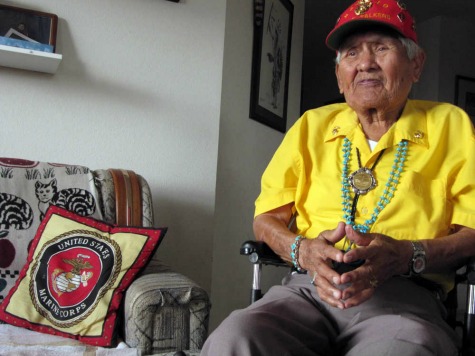
Chester Nez, one of the 29 original Navajos who were recruited to help the American military transfer information in a code the Japanese military could not break, passed away today at 93. Their efforts in developing a Navajo-based code to communicate war plans were essential for America in World War II.
According to the Associated Press, Nez died of kidney failure on Wednesday morning at the age of 93. He was the last of the original 29 men that developed a code eventually used by hundreds of Navajo military workers to transfer information. Nez, originally from New Mexico, enlisted in the military in tenth grade by lying about his age and helped translate the Navajo language–which at the time did not have a writing system.
Nez and 28 others were chosen to become the first all-Native American unit in the Marines. In the aftermath of Pearl Harbor, military recruiters had the idea of using the elusive Navajo language to send codes and military orders halfway across the globe and foil espionage attempts. Nez was intrigued, living at a boarding school in Arizona and excited to travel to a new place. Nez told Arizona Central in an interview before his death that the idea of traveling the world intrigued him.
Nez explained that many of the difficulties in adapting the language were finding ways to describe war weapons and vehicles that did not have names in Navajo–objects that the group had never seen. Nez eventually not only helped developed the code but entered the theater of war and kept the code a secret for more than 20 years. It took that long for the “code talkers” to receive recognition for their work, as any public acknowledgement previously would have potentially exposed the United States to military harm.
Nez told the Associated Press in a 2009 interview that he was extremely proud of their work, particular of their contributions to the war as a people. “It’s one of the greatest parts of history that we used our own native language during World War II… We’re very proud of it,” he said.

COMMENTS
Please let us know if you're having issues with commenting.